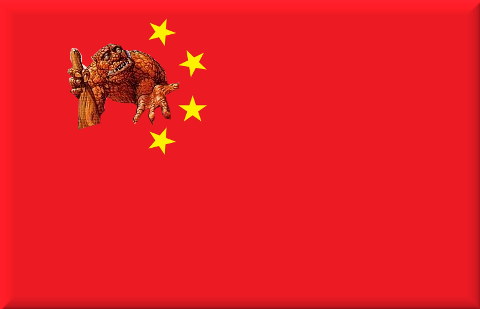

THE Chinese patent system is a disgrace like nowhere else. SIPO is a production line or an assembly line of applications, matching perhaps the stereotypes or stigma associated with the country's manufacturing industry. We wrote a great deal about the short-sightedness of this approach; it'll jeopardise China's economic leadership, except in the litigation space, which can in turn deter/discourage companies from operating there. It's already happening; the writings are on the wall (data points).
"We wrote a great deal about the short-sightedness of this approach; it'll jeopardise China's economic leadership, except in the litigation space, which can in turn deter/discourage companies from operating there."A few days ago (3rd of January 2018) we saw this new article by Hui Wang and Xu Li from Chofn Intellectual Property. Will China be wise enough to put an end to patents on GUI designs? China, as things stand at the moment, is probably the only large country that openly and broadly permits software patents. It became even more lenient on the matter several months ago (further revisions to the guidelines). Is code becoming patentable and if so, why would companies not shift all software development to India (where such patents are banned)? Does China really want this? Patents in China have gone so awfully out of control that some people pursue patents on GUIs. What benefit would workarounds have except confusing users (inconsistent interfaces)?
The parallel universe which is the patent trolls' lobby loves China. It's the new 'darling'. For those who make a living out of litigation China is looking more and more like a paradise or greener pastures. Here's one of them writing that "China invention patent applications reached nearly 1.4 million in 2017 - 14% year-on-year increase..."
"The parallel universe which is the patent trolls' lobby loves China."A worker of a patent troll wrote: "A massive number indeed. Let's keep the "their quality is poor" rhetoric down...they will get better, faster with these kinds of numbers. The world should be on notice."
To these people (trolls and their friends at IAM) all these patents are potential profit. At whose expense? Non-trolls. China's patent bubble is going out of control. It spins out of reason. The Chinese press says this:
China made 1.38 million invention patent applications in 2017, a 14.2 percent increase year on year, an intellectual property official said here Thursday.
Of the total applications, 744,000 patents have been handled and concluded, said Shen Changyu, head of the State Intellectual Property Office, told a meeting attended by intellectual property officials from across the country.
"To put things in perspective, 744,000 patents being handled in one single year is probably more than the rest of the world combined.""Story also notes Shen Changyu, head of the State Intellectual Property Office, has urged strengthening of IP protection in China," Managing IP wrote some days ago. They just try to impress the world with numbers, just like Battistelli. The quality does not seem to matter. Patent scope doesn't matter either. Without speaking Mandarin it's hard to scrutinise individual patents and considering weak protections for free speech in China do not expect a Mandarin equivalent of "Stupid Patent of the Month".
Karry Lai, writing from Hong Kong for Managing IP, had this to say: (the headline states "China tipped for doubling in NPE [read: trolls] patent suits in 2018")
Non-practicing entities [read: trolls] are looking to take advantage of China’s courts, with some predicting at least a doubling of NPE patent cases in 2018. But a number of factors act as deterrents in China, meaning plaintiffs need to know how to play the game
"They're called not only "trolls" but also "cockroaches" and worse words."In some circles, China is nowadays becoming better known for patent litigation than for production/manufacturing (a shot in the foot, except for lawyers). Here's what IAM wrote some days ago :
The biggest contrast is in the damages sought. Baidu is asking the Beijing court for around $7.6 million plus legal costs, in addition to an order halting JingChi’s use of any misappropriated technology. This is not a small sum for China, where a recent World Trademark Review article pointed out that the norm in trade secrets cases is statutory damages amounting to less than Rmb 1 million ($154,000). But it pales in comparison with the amount that Waymo could be expected to recoup if it convinces a jury that Uber’s Ottomoto and Otto Trucking divisions were built on stolen technology. Given what’s at stake in China’s autonomous driving market, $7.6 million may not provide much of a deterrent to companies seeking to gain a technical edge and attract investment.